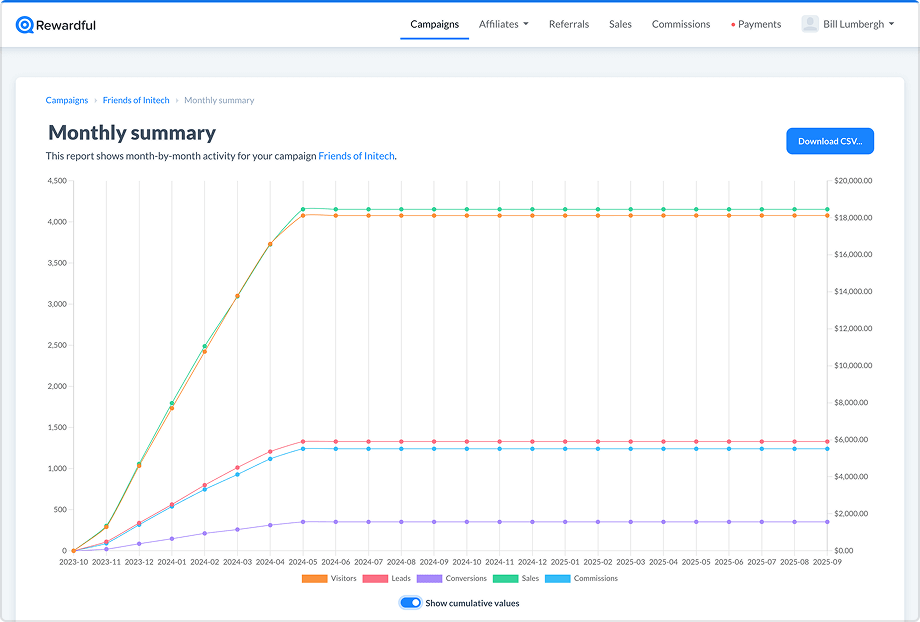As affiliate programs grow in popularity and generate increasing revenues, affiliate fraud detection becomes critical as fraudulent affiliates and abusive practices continue to evolve and multiply in 2026.
With the affiliate marketing industry set to surge from $17 billion in 2024 to $27.78 billion by 2027, fraudulent affiliate partners are becoming increasingly sophisticated at exploiting program vulnerabilities - costing businesses billions in fraudulent commissions.
The explosive projected 63% growth trajectory isn't just attracting honest affiliates.
It's creating a breeding ground for credit card fraud, fake leads, unethical practices and sophisticated malicious activities.
As more companies turn to affiliate marketing for growth, understanding how to detect and prevent fraud isn't just about avoiding potential losses and limiting future risk.
It's essential for sustainable program success.
This comprehensive guide breaks down the latest affiliate fraud detection techniques, warning signs, common tactics, and prevention strategies to help you safeguard your affiliate marketing program.
You'll discover actionable steps to identify malicious tactics and various types of fraud, implement effective monitoring systems to protect legitimate customers and affiliate marketers to ensure your affiliate program maintains its integrity.
Understanding All Types of Affiliate Marketing Fraud
Before talking about affiliate fraud prevention, it's essential to understand what affiliate fraud entails so you can recognize it.
Typically, affiliate scams involve deceptive practices where affiliates generate false identities to create fake accounts and reap undeserved commissions.
Let’s break down some of the most common types of affiliate fraud and the warning signs associated with each:
Click Fraud
- What it is: click fraud involves generating false clicks on pay-per-click ads. It can be done manually by individuals or, more commonly, by using bots.
- Warning signs: look for anomalous patterns like sudden spikes in traffic, especially during odd hours, or clicks that come from a singular IP address or a concentrated geographic area, often unrelated to your target market.
Lead Stuffing or Cookie Stuffing
- What it is: this involves dropping multiple affiliate cookies onto a user's computer without their knowledge, ensuring that the affiliate fraudster will earn a commission from any future sale.
- Warning signs: a high volume of traffic but low conversion rates. Also, if users complain about unexpected pop-ups or being redirected to unrelated sites, it may be an indication of fraudulent practices.
Typosquatting or URL Hijacking
- What it is: dishonest affiliates register URLs that are typographical variations of your brand’s domain. Unsuspecting visitors, making a typo, land on these sites, and any action they take might earn the fraudster a commission.
- Warning signs: monitor domain registrations for versions very close to your brand. User reports of being on an 'odd looking' version of your website can also be a clue.
Fake Sales or Leads
- What it is: affiliates create fake customer accounts and use stolen credit cards to generate sales. Or, in the case of programs paying for leads, they might submit false information to generate commissions.
- Warning signs: orders that get immediately canceled or refunded, or leads with nonsensical information or odd patterns (e.g., “aaa@bbb.com”).
Spamming
- What it is: using unsolicited emails, messages, or comments to promote affiliate links.
- Warning signs: if you start receiving complaints from users about spam or if you find your links in questionable online areas without your knowledge, you might be dealing with a rogue affiliate.
Why Fraud Detection is Crucial
While affiliate marketing offers businesses a cost-effective way to boost sales, undetected fraud can quickly eat into your profitability.
Here’s why investing in fraud prevention pays off:
- Financial integrity: undetected fraud can lead to significant financial losses. Every fake click or fraudulent transaction chips away at your revenue.
- Trust maintenance: fraud undermines the trust between businesses and genuine affiliates. When trust fades, the effectiveness and authenticity of the entire system come into question.
- Program reputation: the credibility of your affiliate program is at stake. If the marketplace perceives your program as easily exploitable or filled with fraudulent activities, it can deter genuine affiliates from joining. Remember: information about fraudulent affiliate programs spreads quickly within the affiliate community.
- Real sales impact: potential customers might hesitate to purchase if they suspect or hear about fraudulent activities linked to your brand. This could lead to less real sales.
- Operational efficiency: continually addressing and resolving fraud issues takes up valuable time and resources that could be better used for scaling and optimizing your affiliate strategy.
- Affiliate relations: genuine affiliates could feel demotivated or cheated if they perceive that others are gaining undeservedly. This can affect their performance and loyalty.
Detecting Affiliate Fraud: Red Flags and Action Plans
We already shared how people are committing fraud with affiliate programs, but that doesn't necessarily help to spot it when it’s happening.
Your sales might look real for a while, or perhaps it might just look like a certain campaign was incredibly successful. There are, however, some things to look out for and actions to take, which we’ll flag below.
Irregular Traffic Patterns
- What it means: consistency is a common trait in genuine traffic. However, unexpected and unexplained spikes, especially from a specific source, can signal foul play.
- Taking action: monitor your traffic sources and use analytics tools to receive alerts when there's an abnormal surge. Investigate the source and evaluate its legitimacy.
Quick and Frequent Commissions
- What it means: while it's a dream come true to have active and successful affiliates, when commissions are generated too quickly, it's often too good to be true.
- Taking action: review the sales journey. Check the frequency, time, and the IP addresses. If multiple sales originate from the same IP in quick succession, you might have a fraudster in your midst.
High Bounce Rates
- What it means: high bounce rates, especially when combined with increased traffic, can indicate an artificial inflation of clicks – a hallmark of click fraud.
- Taking action: inspect the duration visitors spend on your site. If they leave immediately and consistently, consider delving into the traffic sources and the nature of the referring sites.
Mismatched Geographic Locations
- What it means: if your product or service caters to a specific location, but you notice a sudden influx from unrelated regions. This is usually a red flag.
- Taking action: geo-target your campaigns when necessary. If you're targeting customers in the U.S., for instance, and see a surge from Italy or Asia, it's essential to scrutinize these suspicious traffic sources.
Discrepancies in Conversion Paths
- What it means: if certain affiliates have conversion paths that starkly contrast with your average user journey, there might be some manipulation at play.
- Taking action: map out the usual conversion paths. Any deviation from this norm, especially if it's repetitive and overly efficient, should be analyzed in detail.
Steps to Preventing Affiliate Fraud with Proactive Measures
The earlier you catch affiliate fraud, the better. But above everything, it's even better to prevent it.
This is crucial in ensuring that your marketing investments are channeled effectively.
Here's an in-depth look at crucial steps you can take:
Step 1: Vet Affiliates Carefully
Just like hiring a new employee, onboarding an affiliate requires due diligence.
The more you know about your affiliates, the better you can gauge their authenticity.
Don’t just rely on application forms.
- Verify name, email address, phone.
- Conduct interviews.
- Seek out past partnerships.
- Check for fake reviews.
- Assess their online presence.
If their online activities seem sketchy or too fresh, tread with caution.
Step 2: Set Clear Affiliate Guidelines
Clear rules serve as a roadmap for affiliates. They not only know what is expected but are also clear about what constitutes a violation.
Create a comprehensive affiliate guideline and formal terms and conditions document. Outline accepted marketing practices, forbidden tactics, and potential penalties for violations.
Ensure every affiliate has a copy and understands its content.
Step 3: Limit the Initial Commission
An initial cap can deter affiliate fraudsters looking for a quick payday.
You can do this by implementing a tiered commission system. Newer affiliates could start with a lower commission percentage, which can increase as they showcase genuine results over time.
The downside of this tactic, however, is that it is also less appealing to genuine affiliates and legitimate partners.
Keep in mind that this could seriously affect your signup rates.
Step 4: Frequent monitoring
Regular oversight can help spot anomalous patterns early.
This not only protects your budget but also maintains the integrity of your program. Use comprehensive fraud detection tools like Rewardful that offer real-time insights.
We help you deal with suspicious affiliates, and you can implement measures that prevent self referrals.
How an Affiliate Tracking Platform Can Help
Reliable affiliate software is instrumental in both fraud detection and prevention. This added layer of security ensures that you are only paying for legitimate leads from affiliates.
Here’s how:
- Real-time monitoring: instant insights from software like Rewardful can prevent financial losses by allowing prompt action on suspicious affiliate actions.
- Advanced analytics: deep insights into metrics offer a comprehensive view of affiliate performance, making it easy to spot fraud.
- Automated alerts: continuous monitoring is key, but instant alerts notify businesses of potential red flags to help you stay on top of things even when you get busy.
- Integrated fraud detection: proactively filtering suspicious behavior is crucial; affiliate software systems detect and counter common fraudulent tactics without you having to chase it.
- Streamlined management: Rewardful's intuitive dashboard ensures efficient oversight of all affiliate operations, from onboarding to payouts.
Are You Protecting Your Affiliate Marketing Program Against Fraud?
Interested in a secure affiliate software solution for your program?
Dive into the features and advantages of Rewardful. See how our tool can combat affiliate marketing fraud and enhance profitability.













